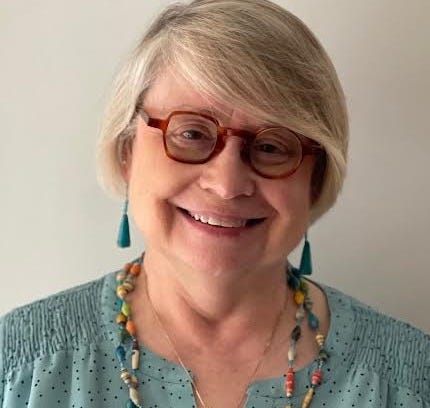Trump's anti-DEI agenda waged on the backs of rape, domestic violence victims
The Administration requires government programs not to promote “gender ideology." Coalitions, including in Iowa, are suing over what that would do to the Violence Against Women Act.

What follows is a guest column by my friend Beth (Elizabeth) Barnhill, a community volunteer who served for 33 years as executive director of the Iowa Coalition Against Sexual Assault and has been my go-to resource on that issue for decades. — Rekha Basu
By Elizabeth Barnhill
As a college student, I was raped at knifepoint while walking home. I made my way to a police station and was fortunate to talk with an understanding detective and a friend who happened to be working. There was not, however, any ongoing assistance for immediate and longer-term problems. The professor who refused to allow me to delay a final treated my story as just another undergraduate excuse. The rest of the semester, the rest of my college years, was a struggle. I spent years terrified of sleeping alone in an apartment, building towers of knives in front of my doors. My friends were kind, but there was no one who understood the continuing trauma.
Thirty-one years ago, a few years after my assault, Congress passed the Violence Against Women Act, VAWA, to provide comprehensive assistance for victims who experienced domestic and sexual assault. Since that time, funding has been available to address a broad range of activities; services for victims, prevention of sexual and domestic violence, facilitation of collaborations between law enforcement and victim service providers, housing needs, access to legal help, and other activities. The VAWA funding helped agencies develop from small and often volunteer efforts into those which could effectively address trauma and the many needs of victims.
Now, however, the Trump administration is furthering its anti-DEI agenda on the backs of victims of rape and domestic violence, and the agencies whom they assist. Nearly every member of the Division of Violence Prevention has been fired, ending the only federal level funding directed to intimate-partner violence and research. Programs are now facing requirements to certify that they don’t promote “gender ideology,” run diversity, equity and inclusion programs or prioritize people in the country illegally.
Seventeen statewide anti-domestic violence and sexual assault coalitions including the Iowa Coalition Against Domestic Violence, are suing the administration after receiving the Department of Justice’s Office on Violence Against Women updated grant guidelines on May 7. The guidelines require certification that they do not engage in “out-of-scope” activities.
Also included on the lawsuit are coalitions in California; Colorado; Washington, D.C.; Idaho; Kansas; Massachusetts; Minnesota; Montana; North Carolina; Oregon; Pennsylvania; Rhode Island; Virginia; and Wisconsin. Along with the National Women’s Law Center, they’re represented by Democracy Forward; Jacobson Lawyers Group; Lynette Labinger for the ACLU Foundation of Rhode Island; and DeLuca, Weizenbaum, Barry & Revens, Ltd. for the Lawyers’ Committee for Rhode Island.
Those “out-of-scope” activities are similar to those being prohibited in other federal programs and say that agencies may not promote “gender ideology,” or engage in “activities that frame domestic violence or sexual assault as systemic social justice issues rather than criminal offenses,” or promote the “violation of federal immigration activities.” If they engage in such loosely defined activities, they risk losing their funding and ability to help victims.
The newly required certifications are not only antithetical to the organizations’ commitments to assist all victims of violence, but in direct conflict with language in the Violence Against Women Act itself. VAWA requires programs to assist victims in underserved communities, including those in remote geographical locations, specific racial or ethnic populations, or those who have needs such as language barriers or disabilities. VAWA has also, from its inception, included a specific focus on the unique problems faced by immigrant victims of domestic violence and sexual assault. Among other measures, Congress provided for a mechanism for abused spouses and children to self-petition for immigration relief.
Congress also recognized that violence against women was part of larger systemic issues — namely gender-based violence that disproportionately targets women. Services, however, were never limited to women, and VAWA was written in gender-neutral language.
The lawsuit filed by the coalitions says that not only are the funding conditions in direct conflict with VAWA, but they violate the Constitution. The conditions exceed the statutory authority of the administration; the Executive Branch cannot impose conditions that Congress did not authorize.
The language of the conditions is vague and provides no clarity about the actual conduct prohibited. The Trump administration has threatened the organizations with substantial penalties under the False Claims Act if they violate any of the conditions.
Agencies are faced with the choice of adhering to their missions and refusing to sign the certifications or complying with unclear conditions that discriminate against the very people they were created to serve.
If they refuse to serve individuals or discuss services based on the Violence Against Women Act itself, does that mean they would turn away individuals seeking help, or not be allowed to publicize their services in the community? If they assist a battered or raped immigrant, is that a “violation of immigration activities?”
As of now, early negotiations with the Department of Justice’s Violence Against Women Office have allowed suspension of the requirements until at least August 12, 2025. Depending on the outcome of those negotiations, agencies may be faced with complying with a racist, xenophobic, and transphobic agenda or closing critical, long fought for services.
On June 27 a preliminary injunction was filed. The injunction requests relief from the “out-of-scope” funding conditions for all pending or future applications, and from requiring awardees to agree to the General Anti-DEI Certifications.
The suit is one of more than 200 filed since January challenging Trump’s executive orders.
I’m a proud member of the Iowa Writer’s Collaborative. Click below for the full roster.




Thank you for sharing this story and for all your work to advocate for women. Grateful.
Beautifully written!!